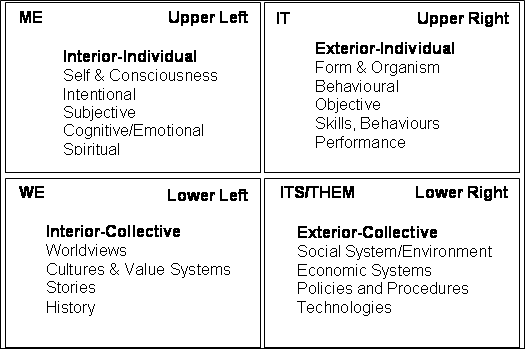Leaders who dare: a new paradigm to enhance the knowledge and policy interaction
- Vanesa Weyrauch

- Jul 17, 2017
- 3 min read
Updated: Apr 15, 2021

Ken Wilber´s Four Quadrants
As the complexity and depth of organizational and social issues arise, the need for a new type of leadership is more and more evident. At the same time, individuals are increasingly aware that the issues outside are a mirror of the issues inside. However, as Alan Watkins relevantly argues, among 90-95% of the solutions high level executives think about when brainstorming on how to deal with their challenges are external or “IT/ITS solutions” (see Graph of 4 Quadrants or aspects of any aspect of human experience by Ken Wilber below), both at the individual and the collective levels. Very rarely do they think -not yet discuss- about the inner source of their and others´ decisions and actions. This significantly limits the success of these solutions. We are definitely not encompassing the whole picture.
This panorama is completely applicable to every effort to strengthen the use of knowledge in policy. We have disentangled almost every technical and IT/ITS aspect that could enhance how these two worlds interact. We resort to external solutions and approaches (new strategies to convince others or to improve our research and policy influence tangible efforts, more resources, etc.), even though we acknowledge again and again that the decision making processes are totally immersed in individual intentions and cultural factors such as ideologies, values, distribution of power, etc.
Why do we recognize the weight of these invisible forces but do not talk about them nor incorporate them in our actions? Peter Senge offers a very acute explanation: “The social field of most families, teams, organizations and societies remains largely unchanged because our level of attention renders it invisible. We do not attend to the subtle forces shaping what happens because we are too busy reacting to these forces. We see problems, then “download” our established mental models to both define the problems and come up with solutions.”
Sounds like you´ve been there? We at P&I have. Is there a different way to do it? Yes, we believe there is.
At P&I we have had the fortune to work with policymakers and researchers producing policy relevant knowledge for several years. We have discussed their concerns and dilemmas, we have shared frustrations and questions, and we have inspired each other with potential new approaches. And what emerged more and more clearly is that for real and sustainable change to take place, the current way of leading needs to be revisited.
Agents of change frequently feel isolated, tired, solitary Quixotes fighting against windmills. Organizational and contextual forces are so large that to have real impact looks like a utopia. Through our courses and spaces of discussion we have discovered that we are not alone and that there are many others striving for change with similar values and beliefs. How can we from P&I capitalize on this emerging community and contribute to real change?
As Otto Schamer (2016) states in his excellent book Theory U: “The leaders´ new work is about developing an interior holding space-a space that allows them to navigate in the midst of conflicting information and interests, in the midst of institutional failure and systemic breakdowns, in the midst of confusion that makes people turn to anger, fear, and despair”. Does this description resonate with your own challenges? Probably. Are you ready to dare and try a whole new leadership approach? If so, please join us in this uncertain but promising path.

Courtesy of Shannon Holman under CC at flickr.com
The road ahead to lead from the future as it emerges is collective. Internet is the tangible demonstration of the emerging networked leadership, where persons who are geographically very distant can work together due to their very close aspirations. As Barbara Max Hubbard, a visionary futurist has expressed: “We are the lucky generation born precisely when the connectivity is about to happen because people are suddenly empathetic with people around the planet. (…) We are about to wake up to the enormity of our capacity as a co-creative, co-evolving universal humanity”. Why would efforts to promote the production and use of knowledge in policy be disengaged from this amazing opportunity?
P&I will hold a series of chatinars to discuss the potential of a new integral leadership that dares to connect to the future that desires to emerge. If interested in joining us, please send an email to contact@politicsandideas.org and we will share more info. Thanks and welcome in advance!




Commentaires